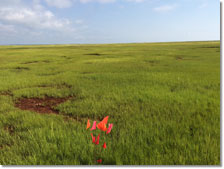NOAA-NERRS supports collaborative research on the inter–connectedness of climate change, coastal salt marshes, and mosquitos

The project entitled, Investigating the Interconnectedness of Climate Change, Nuisance Mosquito Populations, and Long-term Resilience of Coastal Salt Marsh Systems, will examine the intersection between sea level rise, salt marsh structure, habitat modification/ restoration, and nuisance mosquito populations which can pose serious health risks to humans, livestock, and pets. Chief concerns are how climate change and sea level rise may affect marsh habitats and consequent mosquito production but also how past physical alterations to reduce mosquito habitat affect the ability of salt marshes to maintain their relative elevation position and thereby their long term resiliency in the face of sea level rise. The three year grant from the NOAA-NERRS Science Collaborative is for $743,000. The research team, led by Rick Lathrop (CRSSA), includes Dina Fonseca (Entomology), Mike Kennish and Lisa Auermuller (JCNERR), and Scott Crans of the New Jersey Office of Mosquito and Control Coordination. Mosquito control agencies and other land management partners will aid in the design and implementation of a research program to inform management actions, plans and strategies.
For more information go to: http://graham.umich.edu/water/news/nerrs-projects-2016
August 2016 by Richard Lathrop


